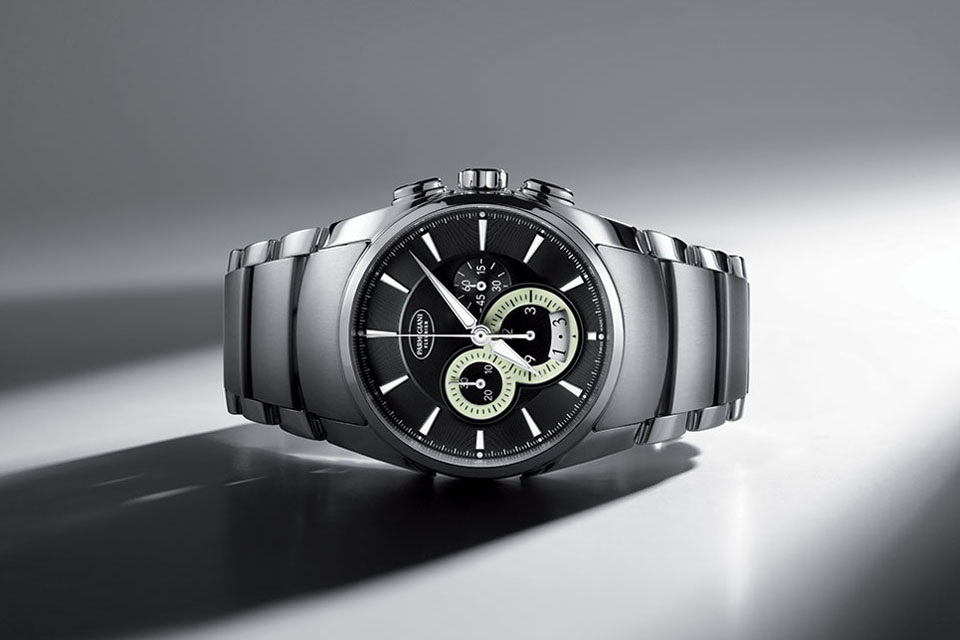The Parmigiani Fleurier Tonda Metrograph with Black Dial: A Watch for the 24-Hour Urbane Sophisticate

Parmigiani Fleurier’s Tonda Métrograph is ready for the busy lives of today’s modern professionals. The black dial is the sportier Métrograph version with green sub-dial chapter rings by day and luminescent circles by night, giving the city dweller a seamless transition between work and play. It is this quiet metamorphosis that matches the professionalism of a day’s demands and the unplugged fulfillment of a city’s nightlife. SIHH 2014 introduces us to the bad boy member of the Métro collection.

The black dial Métrograph offers more personality than the white dial version, but either watch excels. Normally, a black dial denotes a metropolitan dress watch, but the mischievous green around the sub-dials signals there is more than meets the eye. The green outlined sub-dials make a sideways figure 8, which is a familiar asymmetrical layout for the brand. The Bombay portion of the dial, with rhodium plated batons for hours, angles slightly to the dial’s flat center with its three overlapping sub-dials: small seconds, lumed 30 minute counter and lumed 12 hour counter. The elongated, open-worked date window inside the twelve hour chapter ring at 6 o’clock displays odd numbered dates as numerals and even numbered dates as dots. The white background highlights the rotating date.

The 40mm stainless steel case on the steel bracelet offers a more sporting profile, but the watch also is available with a black Hermès leather strap. With the steel bracelet, both the lugs and the links exhibit the company’s iconic teardrop shape. A subtle distinction of the case is the different lugs on the left-hand side and the right-hand side of the watch. On the left, sans crown, the lugs appear normal, but on the right, they form an elaborate wave that envelopes the case; just another asymmetrical detail of this dual-purpose Gemini.

When the lights go out, this watch lets loose. Lumed delta hands, lumed chronograph seconds hand, lumed batons and the devilish green lume of the sub-dials shine brightly. In the dark, the figure eight commands attention. Though the hands on the chronograph sub-dials are without illumination, the luminescent chapter rings reveal the dark hands in relief. Need to time how long it takes for the martinis to arrive in the club’s low light – no problem.

Parmigiani Fleurier is a name associated with not only phenomenal watches, but also with high-end movements provided to the watch industry. Many talented independent watchmakers once worked at this company. Think talent. That kind of reputation stands behind the in-house automatic PF315 calibre, which uses two series-coupled barrels to eke out 42 hours of power reserve. Vaucher Manufacture, located in Fleurier, produces the 351 components of the PF315. The transparent caseback reveals the movement’s meticulous decoration of Côtes de Genève patterns and beveled bridges.
Every twenty-four hours has light and dark. The Parmigiani Fleurier Tonda Métrograph suits them both.
More info: www.parmigiani.ch




4 responses
The base movement might be in-house but what about the chronograph module from Dubois-Dépraz? Nothing bad at all but as a watchmaker I can tell you that there is not a slice of haute horlogerie in it. No column wheel, all parts are stamped with usually no particular finish, etc. This same industrial module is also used by many many profane brands and usually sits on top of an ETA 2892A2 or a Sellita 300 movement.
@Peter In many cases you would have been right, however not in this case. Parmigiani owns their own movement manufacture in FLeurier, called Vaucher. The movement is entirely conceptualized, designed, manufactured, finished (to the highest standards) and assembled there. Parmigiani further owns a case manufacture, a dial manufacture and everything but the strap (Hèrmes), crystal and hands, are designed and manufactured in-house.
Dear Frank,
Believe me, the chronograph MODULE comes from Dubois Dépraz. Not the base movement of course. Does Parmigiani claim that they developed a chronograph module themselves ? This would be new. By the way, it is the same module used by Tag Heuer for some of their Monacos to mimic the old caliber 11/12 (pushers are on the opposite side of the crown). Tag Heuer puts the module on top of an ETA or Sellita.
You are right for the rest. They have a movement, case and dial maker, etc. They nonetheless still use some movements and modules from other companies, like Christophe Claret (RM), Zenith (El Primero), Dubois Dépraz (chronograph modules), Agenhor (GMT module), to name just a few. Nothing bad at all, there are no reasons to hide it.
Peter, you’re absolutely right! During SIHH I talked with PF about this and the admitted to using DD modules for the chrono. Like on the Bugatti Aerolithe, although it’s reversed on that one.
Thanks for correcting!